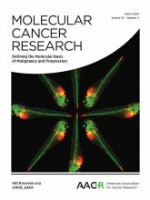
MOLECULAR CANCER RESEARCH
Scope & Guideline
Unveiling Molecular Insights in Oncology
Introduction
Aims and Scopes
- Molecular Mechanisms of Cancer:
The journal focuses on detailed investigations into the molecular biology of cancer, including genetic mutations, epigenetic alterations, and signaling pathways that contribute to tumorigenesis. - Therapeutic Resistance:
Research addressing the mechanisms of resistance to conventional and targeted therapies is a core area. This includes studies on how cancer cells adapt to treatments and the identification of potential strategies to overcome these resistances. - Tumor Microenvironment Interactions:
A significant emphasis is placed on understanding the interactions between tumor cells and their microenvironment, including immune cell dynamics, stromal influences, and extracellular matrix components. - Novel Biomarker Discovery:
The journal encourages studies that identify and validate new biomarkers for cancer diagnosis, prognosis, and therapeutic response, which can enhance personalized medicine approaches. - Clinical Translational Research:
Research with direct implications for clinical applications, including studies on patient-derived models, clinical trials, and translational strategies, is highly valued. - Emerging Technologies and Methodologies:
Utilization of cutting-edge technologies, such as single-cell genomics, proteomics, and advanced imaging techniques, to uncover new insights into cancer biology is a consistent focus.
Trending and Emerging
- Immunotherapy and Immune Microenvironment:
There is a growing emphasis on understanding the immune microenvironment and the mechanisms of immune evasion, with many studies focusing on how tumors interact with immune cells and the implications for immunotherapy. - Targeted and Combination Therapies:
Research exploring targeted therapies, particularly in combination with other modalities (e.g., immunotherapy, chemotherapy), is on the rise, reflecting the need for multifaceted treatment strategies. - Epigenetic Modifications:
The role of epigenetics in cancer progression and treatment response has gained significant attention, with studies frequently exploring how epigenetic changes can be targeted for therapeutic benefit. - Metabolic Reprogramming in Cancer:
An increasing number of studies are investigating how cancer cells alter their metabolism to support growth and survival, which is critical for developing new therapeutic strategies. - Single-Cell and Multi-Omics Approaches:
The use of single-cell sequencing and multi-omics approaches to dissect tumor heterogeneity and understand cancer biology at a granular level is rapidly expanding, allowing for more precise insights into tumor behavior. - Patient-Derived Models:
There is a notable trend towards the use of patient-derived xenografts and organoids, which provide more relevant models for studying tumor biology and therapeutic responses.
Declining or Waning
- Traditional Chemotherapy Mechanisms:
Research specifically centered on traditional chemotherapy mechanisms appears to be waning, as the field increasingly shifts towards understanding targeted therapies and immunotherapies. - Basic Cancer Cell Biology:
While foundational studies remain important, there is a noticeable decline in simplistic studies focused solely on cancer cell biology without integration into broader therapeutic contexts or technological advancements. - In Vitro Studies without Clinical Relevance:
The publication of studies that do not translate findings to clinical relevance or do not utilize patient-derived models is decreasing, reflecting a move towards more clinically applicable research. - Single-Agent Drug Studies:
Investigations focusing exclusively on single-agent drug efficacy without exploring combination therapies or multidrug resistance mechanisms are less prevalent, as the field recognizes the complexities of cancer treatment.
Similar Journals
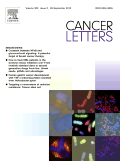
CANCER LETTERS
Transforming discoveries into therapeutic realities.Cancer Letters, a leading journal published by Elsevier Ireland Ltd, is dedicated to advancing the field of oncology and cancer research. With a rich history that spans from 1975 to 2024, this esteemed journal has established itself as a vital resource within the scientific community, holding a prestigious Q1 status in both Cancer Research and Oncology categories as of 2023. With an impressive ranking of #26/404 in Medicine _ Oncology and #19/230 in Biochemistry, Genetics and Molecular Biology _ Cancer Research, Cancer Letters sits in the top percentiles of its field, reflecting its high impact and relevance. Although it does not currently offer open access, the journal remains committed to disseminating paramount research findings, innovative methodologies, and critical reviews that inform and enhance ongoing studies in cancer therapeutics and patient care. Researchers, professionals, and students alike will find invaluable insights into the latest developments and discoveries in cancer research through the pages of Cancer Letters.

JOURNAL OF EXPERIMENTAL & CLINICAL CANCER RESEARCH
Empowering the global fight against cancer with open access.The JOURNAL OF EXPERIMENTAL & CLINICAL CANCER RESEARCH, published by BMC, is a leading open-access journal dedicated to advancing the field of cancer research and oncology. Since its inception in 1982, this esteemed journal has fostered innovation and collaboration in the scientific community, as evidenced by its outstanding impact factor and position in the Q1 quartile for both Cancer Research and Oncology categories in 2023. With a proud commitment to disseminating high-quality research, the journal operates under an open-access model, ensuring that findings are readily accessible to researchers, healthcare professionals, and students worldwide. The journal has established a distinguished reputation, ranking 23rd out of 404 in Medicine oncology and 16th out of 230 in Biochemistry, Genetics, and Molecular Biology (cancer research), showcasing its importance and influence in guiding the future of cancer treatment and research. With the aim of bridging experimental and clinical research, this journal invites submissions that push the boundaries of our understanding of cancer biology and therapy.

Cancer Cell International
Exploring New Horizons in Cancer TreatmentCancer Cell International, published by BMC, is a transformative open-access journal established in 2001, dedicated to advancing the field of oncology and cancer research. With its ISSN number not specified and an E-ISSN of 1475-2867, the journal proudly operates from the United Kingdom, located at CAMPUS, 4 Crinan St, London N1 9XW, England. Renowned for its rigorous peer-review process, Cancer Cell International has made significant strides, securing a Q2 ranking in Cancer Research and Q1 rankings in both Genetics and Oncology as of 2023. It ranks impressively in Scopus, featuring in the top quintile of Genetics (#37/347) and Oncology (#52/404), indicating its importance within the scientific community. The journal's broad scope caters to a diverse array of topics within cancer biology, making it an invaluable resource for researchers, professionals, and students seeking to stay at the forefront of cancer science. With a commitment to disseminating high-quality research, Cancer Cell International invites scholars to explore innovative findings and contribute to the collective effort of combating cancer.
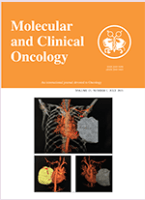
Molecular and Clinical Oncology
Uncovering the molecular secrets of oncology.Molecular and Clinical Oncology is a dynamic journal published by SPANDIDOS PUBL LTD, aimed at advancing the understanding of cancer biology and treatment modalities. With an ISSN of 2049-9450 and an E-ISSN of 2049-9469, the journal serves as a critical platform for researchers and clinicians dedicated to uncovering novel insights in molecular oncology and enhancing clinical practices. As a testament to its growing influence, the journal has achieved a Q3 ranking in Oncology and a Q4 ranking in Cancer Research for the year 2023, reflecting its commitment to publishing high-quality research. Although currently not an Open Access publication, the journal offers crucial subscription options, ensuring comprehensive access to groundbreaking studies and innovations in the field. With converged years spanning 2018 to 2024, the journal is set to continue enriching the academic community with its valuable contributions, ultimately empowering researchers, professionals, and students engaged in the fight against cancer.

NEOPLASIA
Leading the way in transformative oncology discoveries.NEOPLASIA is an esteemed open-access journal dedicated to advancing the field of oncology, published by Elsevier Science Inc. since 1999. With an impressive impact factor and recognition as a Q1 journal in Cancer Research for 2023, it holds a significant position within the scientific community, specifically ranking in the 74th percentile globally in the categories of Biochemistry, Genetics, and Molecular Biology. NEOPLASIA seeks to provide a comprehensive platform for innovative research, covering a wide array of topics in cancer biology, treatment methodologies, and therapeutic advancements. Researchers, professionals, and students are encouraged to utilize this resource, which is easily accessible to foster collaboration and stimulate progress in cancer research. As it converges its efforts towards the future of oncology, this journal is poised to remain at the forefront of transformative discoveries that shape our understanding and treatment of cancer.
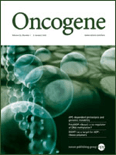
ONCOGENE
Illuminating the Pathways of Molecular OncologyONCOGENE is a premier peer-reviewed journal published by SpringerNature, serving as a crucial platform for innovative research within the fields of Cancer Research, Genetics, and Molecular Biology. With an impressive Impact Factor and a distinguished Q1 ranking across major categories, ONCOGENE publishes cutting-edge studies aimed at unraveling the complexities of cancer biology and genetic mechanisms. The journal has been a vital resource for the academic community since its inception in 1987, and it continues to foster rigorous scientific discussions and collaborations. Researchers, professionals, and students can access a wealth of critical insights and advances in cancer genomics and therapeutic approaches, cementing ONCOGENE’s role as a leading voice in the landscape of biomedical research. For comprehensive academic research, ONCOGENE remains an indispensable source of knowledge with contributions that significantly impact the evolution of cancer research and treatment strategies.
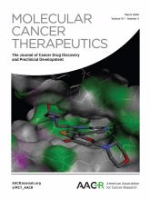
MOLECULAR CANCER THERAPEUTICS
Transforming cancer care with cutting-edge research.MOLECULAR CANCER THERAPEUTICS, published by the American Association for Cancer Research, is a premier journal dedicated to advancing the field of cancer research and therapy since 2001. With a notable impact factor reflecting its high-quality content, this journal stands out in the Q1 category for both Cancer Research and Oncology as of 2023. Researchers, clinicians, and students interested in innovative treatment strategies and molecular mechanisms can find valuable insights within its pages, bolstered by a rigorous peer-review process and a global perspective on cancer therapeutic developments. Although the journal operates under a subscription model, it provides comprehensive access to cutting-edge studies and reviews that drive forward the understanding of cancer biology and treatment modalities. The journal's impressive Scopus rankings further validate its influence within both oncology and the broader cancer research community, making it an indispensable resource for anyone committed to combating cancer through science.
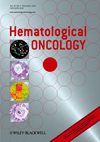
HEMATOLOGICAL ONCOLOGY
Shaping the Future of Cancer Treatment and ResearchHEMATOLOGICAL ONCOLOGY, published by Wiley, is a premier journal in the fields of cancer research, hematology, and oncology, with a rich history of publication dating back to 1983. With an impact factor indicative of its influential standing—ranking in the second quartile in multiple categories including Cancer Research, Hematology, and Oncology—this journal serves as a vital resource for researchers, clinicians, and students alike. HEMATOLOGICAL ONCOLOGY is based in the United Kingdom and focuses on the advancements and challenges in the understanding and treatment of hematological malignancies. While it does not offer open access options, its rigorous peer-review process ensures that all published articles are of the highest quality, contributing to the ongoing dialogue and research in this critical area of medicine. With its commitment to disseminating impactful research, HEMATOLOGICAL ONCOLOGY remains an essential platform for driving innovation and collaboration within the global scientific community.

Translational Cancer Research
Empowering cancer research with open access insights.Translational Cancer Research, published by AME Publishing Company in Hong Kong, is a pivotal journal aimed at fostering the advancement of oncology-related knowledge through the dissemination of high-quality research findings. With its ISSN 2218-676X and E-ISSN 2219-6803, this journal serves as a vital resource for researchers, professionals, and students in the fields of Cancer Research, Oncology, and Radiology, Nuclear Medicine, and Imaging. Established in 2012, the journal covers the latest breakthroughs and cross-disciplinary approaches that drive innovation in cancer treatment and diagnostics. Although currently classified in the Q4 Quartile for Cancer Research and Q3 for both Oncology and Radiology, Translational Cancer Research continuously works toward improving its academic influence and impact, evidenced by its ongoing research contributions. The journal emphasizes open access, making crucial research available to a global audience. We invite scholars and industry professionals to engage with the latest findings and discussions within these critical areas of medical science.

CELL RESEARCH
Connecting Research to Real-World ImpactCELL RESEARCH is a premier peer-reviewed journal dedicated to advancing the field of cell biology and molecular biology, published by SpringerNature. With an impressive impact factor and consistently ranking in the Q1 quartile for both cell biology and molecular biology, this journal serves as a pivotal resource for researchers, professionals, and students seeking to explore the latest discoveries and advancements in cellular mechanisms and their implications for health and disease. Since its inception in 1996, CELL RESEARCH has cultivated a distinguished reputation, currently boasting ranks in the top percentile of Scopus categories, reaffirming its influence and relevance to the scientific community. Although it is not an Open Access journal, its rigorous selection process ensures the publication of high-quality articles that contribute significantly to our understanding of life sciences. For those deeply engaged in the realms of biochemistry, genetics, and molecular biology, CELL RESEARCH is an essential conduit of innovative research and critical insights.